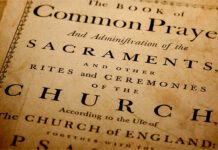There are fires raging in Colorado. Smoke is covering the sky and ash is falling. Beauty is burning and we feel helpless. Brave men and women are running to the flames, doing all they can to contain the fires. Generous citizens are donating resources and time to help each other out.
But there is a nagging suspicion that some Christians have that this is what is going to happen to the world one day. Citing 2 Peter 3, they wonder if “it’s all gonna burn anyway.” Some folks have taken this one step further, suggesting that maybe these fires are an early form of divine judgment. Even those who dare not say this still tend to think that as long as lives aren’t being lost, the burning of forests is not all that tragic. After all, “this world is not our home,” right? Aren’t we just “a-passing through”?
Though this line of thinking has been dominant in Protestant and Evangelical circles for the past two hundred years or so (especially in the West), Christians did not always think this way. In fact, for many centuries, Christians saw themselves as custodians of this world, prophets who were to “proclaim the gospel to all creation” (as St. Francis famously did), and priests who would teach creation to praise the Creator. The Eastern Orthodox Church describes our attitude toward the world as “eucharistic”: we receive the world as a gift and offer it back to God in thanksgiving. (Contrast this with the Evangelical assumption that “dominion” means using and exploiting the world to our consumeristic delight.)
Here are four things to consider from the Scripture:
1. God had the chance to destroy the world…and He didn’t.
Often missed in the analytical and quasi-scientific conversations about Noah’s ark and the Great Flood (“Did he really build a huge boat?” “Is the story myth or hisorical fact?) is perhaps the most theologically significant point of that story: God had the chance to wipe out His creation but He didn’t. In fact, the central theme of the story is that God goes to great lengeths to preserve His original creation, bringing in the animals two by two, male and female, so that reproduction would be possible when the worst was over.
Could it be that the Creator-God does not scrap His projects? Could it be that God is so faithful that He will not abandon His creation, this world that He made and blessed and called good? Even in it’s sin-infected state, God refuses to abolish it. The point of the flood story is not the devastation but the preservation of creation.
2. The “New” may be the “Old”, transformed and transfigured.
When we hear the word, “new”, in the Scripture, we tend to assume it is something altogether different and disconnected from the “old.” But the Old Testament often uses the word “new” in a poetic sense, much like the way it speaks of a “new moon.” They do not mean that a new spherical object appears in the cosmos every 28 days; they mean that it has become “new” again.
The “old covenant”, for example, is completed and culminated in the “new covenant.” The new covenant does not replace the old; it fulfills it. Jesus, the seed of Abraham, becomes “faithful Israel” and therefore completes the original commision on Israel to be a light to the Gentiles and a blessing to all families. Jesus was not “Plan B;” He was always where the Plan was headed.
- What about our “new bodies”? Here, Jesus’ resurrected body offers a clue. Jesus’ old body did not remain in the grave while God gave Him a “brand new one.” It was His same physical body that got reconstituted with new “properties:” he could still eat food and he still had scars…but he could now pass through walls! Paul seems to think there is some continuity between this physical body and the new “Spirit-fueled” body (“pneumatikos” vs. “psychikos” in 1 Cor. 15) that we will receive, which is why we must care for this body (1 Cor. 6).
- What about the “new heavens and the new earth”? When Isaiah first writes of this (Is. 65), the phrases that follow his opening phrase describe not a separate “new” creation, but a fully restored creation– a world that has been “put back together” with “shalom”, the wholeness that Jerusalem is supposed to embody. This is why theologians often use the phrase “transfigured” to speak of the new creation: it is this creation restored and endowed with a new and special glory.
So, while we don’t know what exactly the continuities and discontinuities between this body and the resurrected body are, we are on solid Biblical footing to say there are continuities. I have often wondered that if Jesus’ resurrected body still bear the scars of the violence done to Him by a sinful world, will the “new heavens and the new earth” bear the scars of the violence done to it?
3. Apocalyptic language is not literal.
The Bible contains many different literary genres, many which are not familiar to us. One such genre is called “apocalyptic literature.” This is found in portions of Isaiah (56-66), Zechariah, and other Old Testament “prophet” books. It is also the genre of the Book of Revelation. Unlike prophetic literature, apocalyptic literature is not about predicting the future (Actually, prophetic literature isn’t really about predicting the future either, but I’ll save that for another day!). It does not have the goal of producing action from the listener. Instead, apocalyptic literature shows the world in dramatic, image-heavy terms– the same images used in creation stories to depict chaos: fire, floods, etc. It is heavily dualistic: good vs. evil, light vs. dark, heaven vs. earth, and so on. Ultimately, apocalyptic literature is about giving hope to an oppressed people struggling in despair. It speaks of judgment for the wicked and a final victory that God Himself will accomplish as King of the world.
2 Peter 3 borrows heavily from this apocalyptic tradition. He is not trying to give us a brochure for the end times; he is warning that the wicked will be judged and the righteous– who are suffering at the moment, a major theme for Peter– will be vindicated.
4. God’s judgment is restorative.
One final word about God’s judgment: Unlike so much of our earthly justice, God’s justice never seems to be purely retributive— a judgment that has punishment as its end goal. Instead, God’s justice in the Scripture is restorative— a judgement that has restoration as its end goal. A close reading of the Hebrew prophets shows that exile will not be final. Comfort is coming. Isaiah is a microcosm of this message. Isaiah 1-39 is all about the judgment that has come and is coming for the wickedness of empires and the unfaithfulness of Israel. But Isaiah 40-55 is about the comfort that comes from knowing that the Creator-God is the Covenant-God who will not abandon His people– or His creation! Then, Isaiah 56-66 speaks poetically about the hope of a “new creation.”
God’s judgment is restorative. That does not mean that everyone will be restored, only that God’s goal is not final destruction. Destruction and death are never the last words in God’s book.
In other words, God the Creator has no desire to let it all burn.











